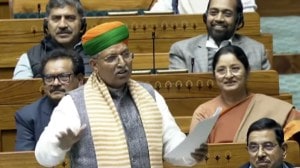What is Israel’s new ‘unity government’ overseeing the military campaign in Gaza?
Which leaders have joined Prime Minister Benjamin Netanyahu, and who have chosen to stay away? Why have they taken this decision?
 Israeli Prime Minister Benjamin Netanyahu attends the weekly cabinet meeting at the prime minister's office in Jerusalem, September 27, 2023. (ABIR SULTAN/Pool via REUTERS//File Photo)
Israeli Prime Minister Benjamin Netanyahu attends the weekly cabinet meeting at the prime minister's office in Jerusalem, September 27, 2023. (ABIR SULTAN/Pool via REUTERS//File Photo) Israel’s Prime Minister Benjamin Netanyahu formed an emergency unity government on Thursday (October 12) with support from the opposition leader Benny Gantz to oversee the war with Hamas.
“The nation of Israel is united, and now the leadership is united,” Netanyahu said in a speech made from the military’s headquarters in Tel Aviv.
What is the ‘unity’ government?
Israel’s politics is deeply divided, and Netanyahu, who is facing charges of corruption, is a hugely polarising figure. The 2021-22 government brought together political rivals Naftali Bennett and Yair Lapid with the main aim of keeping Netanyahu out of power.
In the aftermath of the Hamas assault, Israel’s Parliament on Thursday passed the unity agreement, bringing Benny Gantz, another of Netanyahu’s critics, and five members of his Blue and White party, together with Netanyahu’s far right ruling coalition.
An emergency war cabinet was formed, comprising Netanyahu, Gantz, and Yoav Gallant from the Prime Minister’s Likud party. Gantz is a former army chief.
How will the unity government work?
According to the agreement, the unity government will serve for the duration of the war. The emergency war cabinet is expected to make crucial decisions regarding the conduct of the war.
Till the time the conflict lasts, no legislation that does not concern the war will proceed, the Financial Times reported. This means that the controversial judicial reform pushed by Netanyahu’s government, which split Israeli society down the middle and led to weeks of street protests, has also been put on hold.
Why haven’t more parties joined the unity government?
Several other opposition parties in Israel’s parliament have not joined the unity government. This includes Leader of opposition Yair Lapid’s Yesh Atid, and smaller parties on the left wing, who want no truck with Netanyahu’s far right allies, including the hardline Security Minister Itamar Ben-Gvir.
“Netanyahu and Ben Gvir are not the people who will restore the shattered trust of the Israeli people in their government,” Lapid said in a televised address, according to Reuters. He said his party would not oppose the government, however; and that he would offer his support during the war.
Who are the Prime Minister’s far right allies?
Netanyahu’s ruling coalition includes, apart from his own Likud party, ultra-Orthodox allies, and a far-right faction that won a massive half million votes in last year’s elections. The coalition came to power in December 2022.
Among the most controversial figures of the government is Ben-Gvir, head of the far right Jewish National Front party, who was once convicted of incitement and supporting a Jewish “terror” group. He has been described as being violent, anti-liberal, anti-democratic, and homophobic. Ben-Gvir has repeatedly played the provocateur, making visits to the Al-Aqsa mosque, sparking tensions with Palestinians.
Another hardliner is Finance Minister Bezalel Smotrich, head of the Religious Zionism Party, who has played an instrumental role in pushing for more Jewish settlements in the West Bank. In August 2023, Netanyahu allowed Smotrich to bypass the six-stage process for building settlements, which were considered illegal under international law.
- 01
- 02
- 03
- 04
- 05





































